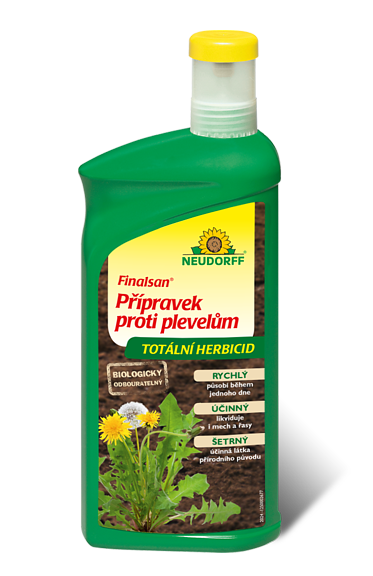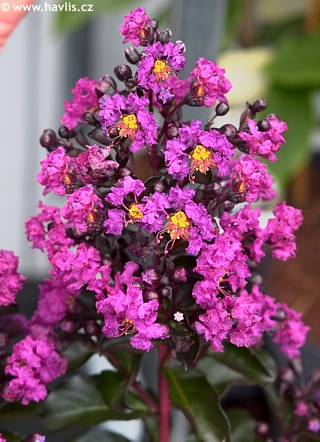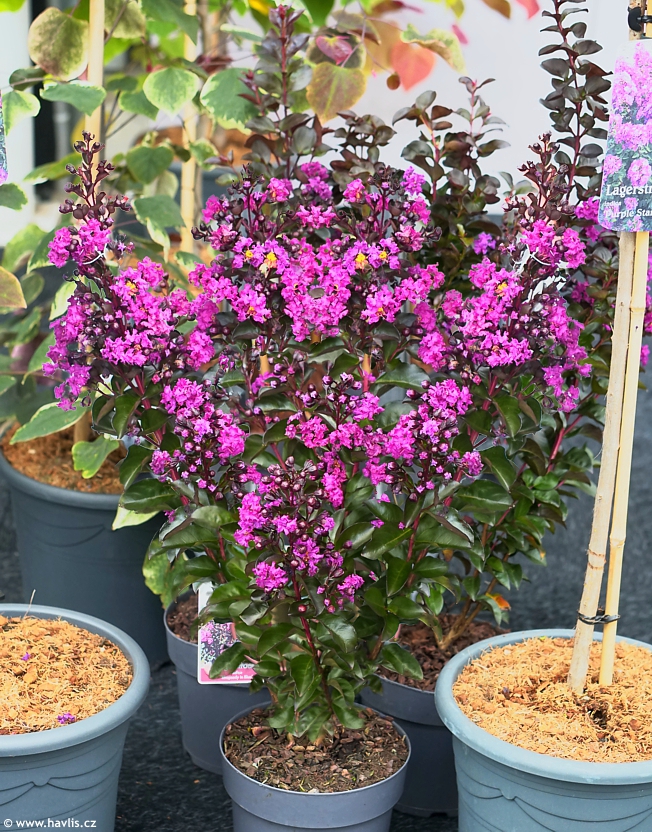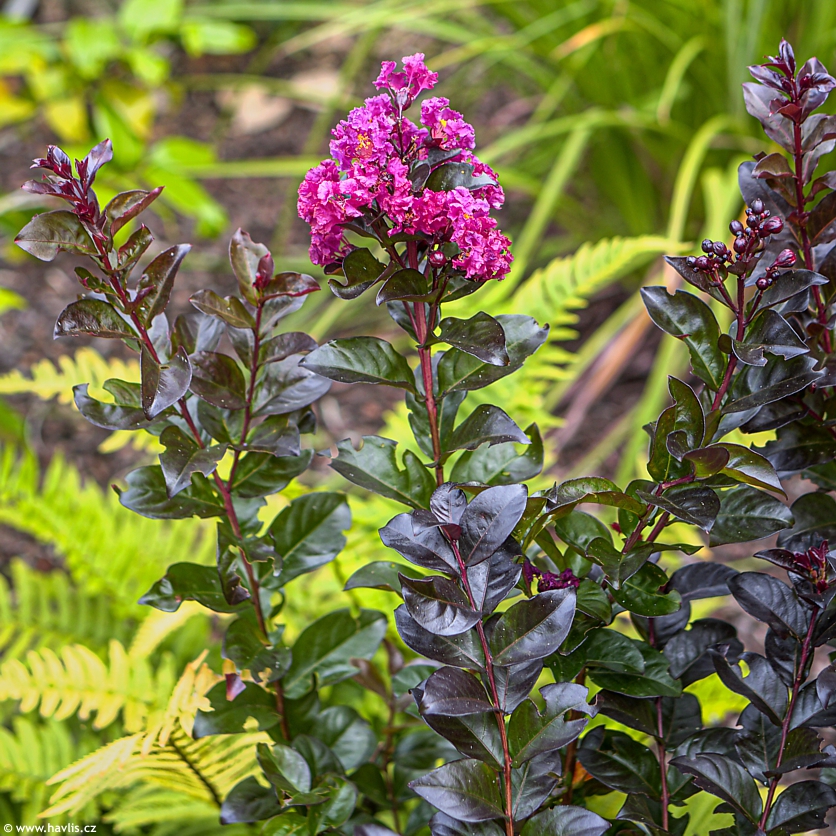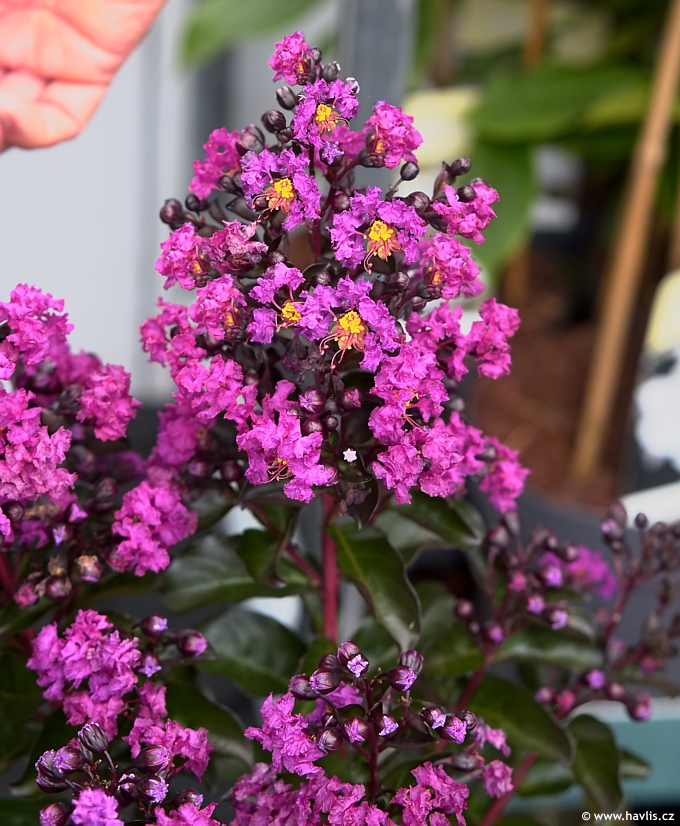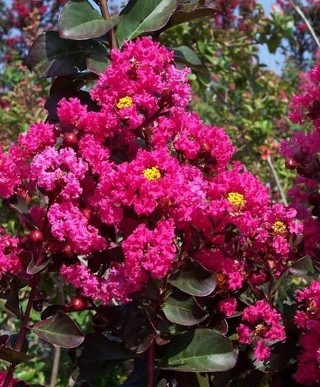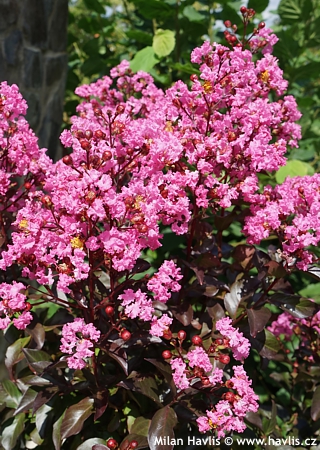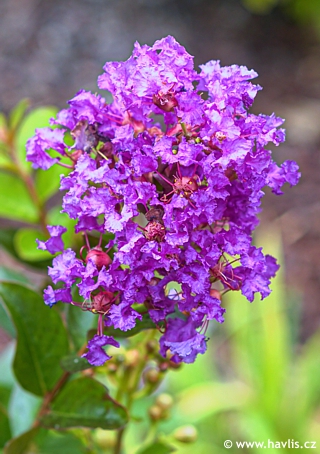Lagerstroemia indica RHAPSODY IN BLUE crepe myrtle
Lagerstroemia
Crape myrtle is a flowering shrub or small tree from China. It was first introduced to the USA and the UK in the 18th century. The original plant lagerstroemia indica is too tender and not too pretty so breeders were working on further hybridization and the most attractive varieties available now are believed to be results of crossing with l.speciosa and l.fauriei. Far more important news for us is the fact that among those finished plants were selected others that survived lower temperatures than what was common in the areas of natural habitat so we have a few myrtles that can grow even in our climate. Some were selections, other consequent hybrids.
Carl Whitcomb is one of the most important breeders of crepe myrtles with exceptional features, of which we particularly appreciate increased hardiness. He owns and runs a research station Lacebark Inc. in Stillwater in Oklahoma, USA, whose USDA zone is the same as warmer parts of Central Europe (7a), which offers great potential for our climate. He has been breeding crepe myrtles for over 40 years, and his very first patented success named Whit I dates back to 1996. He created a series called Oklahoma Tough® which manifests the hardiness of his plants – it often reaches as low as -25 °C (root-hardy). He does not exclusively crossbreed hybrid varieties, but mostly proven varieties of the botanical species l. indica using ethyl methane sulfonic acid methyl ester (EMS), which can penetrate DNA and cause mutations, resulting in significant quality changes in the new generations. Carl Whitcomb focused on selecting those with, in addition to improved beauty, better health and flower sterility which makes possible repeat flowering without exhausting the plant with seed production.
RHAPSODY IN BLUE is an attractive crape myrtle variety from the Play It Again® series introduced in 2022. The series comprises of varieties with double flowering on the same panicle and in a few cases dark foliage as a bonus. RHAPSODY IN BLUE bears deep purple flowers with mauve hues against a background of dark green leaves with dark maroon tones on fully insolated branches. Full sun and a warm location are absolutely essential for colour saturation. The flowers are arranged in upright panicles 8-12 cm long, in Central European conditions they appear (depending on the quality of the summer) from about mid-August, and if the plant has enough nutrients and sunny and warm weather, while the first flowering flush is near its end new flower buds are beginning to form on the same panicle, which significantly extends the flowering period until the end of September or October. The leaves are deciduous, oval, highly glossy and turn orange and red in autumn. They are more resistant to powdery mildew than those of the botanical species. RHAPSODY IN BLUE forms upright shrubs or small trees with dense canopies.
Crepe myrtles naturally form V-shaped shrubs or multi-stemmed trees. You can leave them to their own devices or train them into a spectacular multistems: when your plant reaches a height of around two meters you can start removing lateral branches from the lower parts to shape it into an elegant multi-stemmed tree. Mature trunks produce a beautiful pattern similar to that on planetrees, with several shades of brown, green, and beige. When the trees shed leaves and trunks become bare the display of these coloured trunks of crepe myrtles is usually the best.
Crepe myrtles need little care. They need full sun with zero shade during the day. Grow them in well-drained soil that should be kept moist before the plant is fully established. If cultivated in acidic soil the plant will make fabulous colour play of autumn foliage. Crape myrtle needs heavy mulching in winter and some mulch in summer to retain moisture. Fertilize it in spring to encourage growth (nitrogen-based fertilizers), and in summer to encourage flowering (phosphorus-based fertilizers). RHAPSODY IN BLUE has not yet been tested in all possible climates but has so far proved wood-hardy to -18 °C. It is expected to be similarly hardy like its parent surviving about -20°C in the wood and root-hardy to some -25 °C (USDA zone 6). In case of standard trees hardiness is limited by the rootstock hardiness, always look for details about used rootstock as l. indica is hardy to only about -17 °C irrespective of the grafted variety hardiness.
Last update: 23-09-2023






























